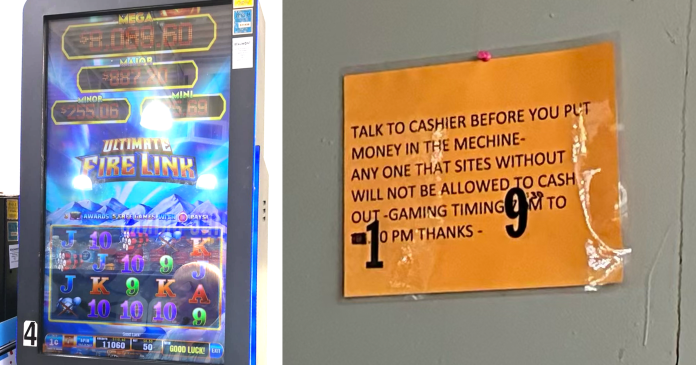The citizens of Beaumont may soon witness a turning point in the city’s approach to 8-liner game play as, throughout Southeast Texas, businesses are being brought to task for skirting the edges of legality while becoming flashpoints for violent crime, gambling addiction and financial exploitation. The question before the Beaumont City Council is not simply whether 8-liner machines, which are essentially casino-style gambling machines, are constitutional or lawful in principle, but whether game owners, which are known for facilitating illegal cash payouts, should continue being allowed to operate.
At last word, City Attorney Sharae Reed confirmed that a long-awaited ordinance regarding 8-liner gaming is expected to appear once again on the July 15 city council agenda. The measure, previously tabled despite growing public pressure, would potentially repeal Article 6 of Beaumont’s Code of Ordinances and effectively ban 8-liner machines within city limits.
Councilmember Cory Crenshaw, a vocal advocate for council action, expressed disappointment during the June 17 meeting as the ordinance did not appear on the agenda. Reed responded that the matter would be included in the upcoming meeting.
Game rooms and convenience/tobacco stores packed with 8-liner machines — electronic slot-style gambling devices — have become common throughout Southeast Texas. While proponents argue the machines offer harmless entertainment and supplemental income, law enforcement and residents paint a much darker picture.
Incidents of violence tied to 8-liner locations are numerous and chilling. In 2015, Mettha Kurrupu, the owner of Pick N Shop on South Major Drive, was gunned down during a robbery tied to the store’s gaming operations. Months later, Shahzaib Nizamani and his cousin, Javed Nizamani, were shot during a confrontation at another family-operated game room — a shooting that ultimately claimed Javed’s life.
Years later, the danger persists. In February of this year, a masked assailant armed with a machete robbed an 8-liner business on South 11th Street. He was later arrested and indicted for aggravated robbery. Last month, the suspect was sentenced to prison.
“There’s no doubt that these places attract crime,” said Jefferson County prosecutor Pat Knauth, referencing a 2010 robbery that escalated into a double homicide by repeat offender Joseph Colone. “These are cash-heavy businesses, often unregulated, and criminals know it.”
Added to questionable legality and crime surrounding these machines, it should also be noted that 8-liner style gaming machines are not regulated in Texas, aside from whatever adjustments the owner sees fit. The Louisiana Gaming Control Board regulates gaming machines, ensuring they aren’t simply set to rip-off customers — a luxury not afforded to those participating in play locally.
Port Arthur Police Chief Tim Duriso noted that many crimes tied to game rooms go unreported due to the illicit nature of activity inside.
“A lot of times, a victim of a crime at a game room doesn’t report it… because of other illegal activity going on at the establishment,” Duriso shared.
Despite mounting concerns, supporters of the 8-liner industry have pushed back against a citywide ban. June 3, Shahzaib Nizamani addressed the council on behalf of 65 local business owners invested in accessory gaming machines. He never mentioned the harrowing encounter that claimed the life of his kinfolk at another game room under Nizamani control.
“These machines help us survive,” Nizamani said, explaining that the 65 businesses represented pay more than $520,000 in regulatory fees annually to the city — money that covers licensing, decals and badges for employees. However, according to City Attorney Reed, the gaming revenue acquired by the city is used strictly for administrative costs, including the purchase of a cash counter after city offices began receiving tens of thousands of dollars in bills at once.
Still, business owner Mohammad Arshad cast doubt on the profitability of the machines themselves, noting that, after fees and compliance, “Each store makes merely enough to cover the wage of a single employee.”
Critics argue that the social costs far outweigh any marginal economic benefit. Many 8-liner businesses are located in low-income neighborhoods, where residents gamble in hopes of financial relief — despite the fact that cash payouts are illegal under Texas law. According to firsthand accounts and anonymous interviews, payouts are common.
“I know for a fact they do pay out,” said one regular player in a recent interview. “They just tell you ‘no’ if they don’t know you.”
Beyond the physical danger posed by armed robberies and repeat violence, 8-liner purveyors are alleged to contribute to deeper societal harm. Gambling addiction is a recognized mental health disorder with far-reaching consequences — from family instability to criminal behavior. Nationally, the social cost is estimated at $14 billion annually.
“Slot-style machines like 8-liners are among the most addictive forms of gambling,” according to AddictionHelp.com, which reports that 75% of problem gamblers play slots.
Jefferson County Game Room Regulations, adopted in 2021, concluded that game rooms “are associated with a wide variety of adverse secondary effects, including but not limited to personal and property crimes, gambling offenses, weapon offenses, illicit drug use and trafficking, and urban blight.”
Four years later, July 15, the Beaumont City Council will decide whether to ban 8-liner machines entirely, phase them out by letting permits expire, or continue regulating them with stricter oversight. The vote follows months of debate, community input and growing pressure from residents demanding action. In Orange County, joint operations have shuttered all known 8-liner operations.
For now, game rooms and 8-liner operators remain in business in Beaumont — many operating in gray areas of the law, all of them operating under the public’s watchful eye. The Beaumont council’s decision may ultimately determine whether the hub city for Jefferson County remains a haven for questionable gaming operations or takes a firm stand against the reported violence, addiction and financial despair left in the wake of illicit – and illegal – gambling.
